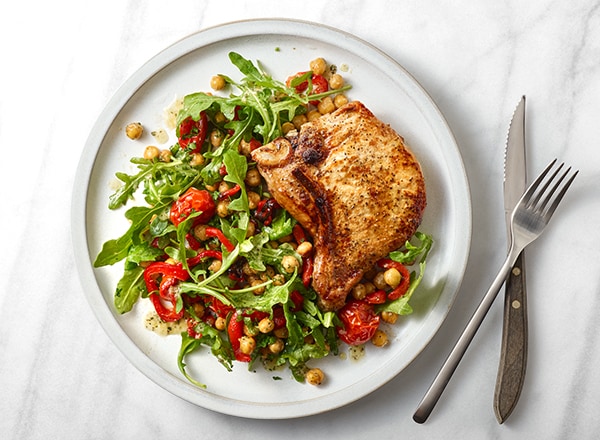Published September 1, 2023
Since digestion affects our whole body, keeping it regulated is necessary for overall health and wellness. Let’s explore ways to support your digestive health.
Recipes.
1. Eat more fiber.
Most Americans don’t eat enough fiber. Women should aim for about 25 grams of fiber per day, while men should try for about 38 grams, or 14 grams for every 1,000 calories. Increase your fiber intake gradually to give your gastrointestinal tract time to adapt.1
The type of fiber matters, too, as both soluble fiber and insoluble fiber necessary for overall health and digestion. Soluble fiber absorbs water, forming a gel in your stomach and slowing it down. It’s found in oat bran, barley, nuts, seeds, beans, lentils, peas, fruits, and vegetables. Specific soluble fibers like oats and barley contain beta-glucan that may help lower cholesterol levels.2
Insoluble fiber adds bulk to your stools and aids in digestion. This type of fiber is found in wheat bran, fruits, vegetables, and whole grains.3

2. Keep hydrated.
When you are increasing your fiber, be sure to drink enough fluids to keep things running smoothly from a digestive point of view. You might have heard that eight 8 oz glasses of water is recommended, but there isn’t any science behind this advice. Hydration needs depend on many factors including your age, sex, activity level, and overall health. For women, the recommended amount of total water is about 11.5 cups per day; for men, about 15.5 cups. This includes all fluids consumed from both food and beverages.4
3. Include pre- and probiotics in your diet.
Consider adding pre- and probiotics to your diet. They may provide benefits for digestive health. Our Publix Aprons® recipes, Broiled Pork Chops with Warm Chickpea Salad and Split Pea, Sausage, and Sauerkraut Stew both feature pre- and probiotic foods.
4. Look into postbiotics.
Beyond prebiotics and probiotics, emerging science reveals the potential benefits of postbiotics. These nonliving microorganisms and/or their components may provide health benefits. In your colon, postbiotics are produced when probiotics feed on several types of prebiotic food such as fiber.5
Since postbiotics are made from fermentation by healthy bacteria in your gut, you can naturally increase your production of postbiotics by eating pre- and probiotic foods.6
5. Consider a low FODMAP diet.
If you have digestive issues, including irritable bowel syndrome (IBS), a low FODMAP diet may help.
6. Eat at regular times during the day.
Keeping a schedule with your eating can help keep your digestive system regular. Try to sit down for breakfast, lunch, dinner, and snacks around the same time each day.
7. Exercise regularly.
Regular activity can help diversify the number of beneficial bacteria in your gut. After a light meal or a snack, go for a walk to give your digestive system a kick-start.7
8. Manage stress.
Elevated levels of stress can negatively impact your gut health, as the gut and brain are connected. Stress can also trigger Irritable bowel syndrome (IBS). Identify the causes of stress in your life and work on ways to remove or lessen their impact on your health.8
Know where to look for information.
Advice on nutrition and fitness is all over YouTube, Instagram, Facebook, and TikTok. You know it’s not all true, but how can you sort fact from fiction? Our dietitians help you avoid nutrition misinformation.
For the love of you.
Choosing how you eat is uniquely personal. It’s about your needs, your preferences, and your goals. As your wellness ally, we’re in your corner with fresh ideas, recipes, and wellness icons that make it easier to shift toward wiser food choices. It’s all about you, at your very best.
Sources
1Larson, Holly. Easy Ways to Boost Fiber in Your Daily Diet. Eat Right. February 26, 2021.
2Webb, Denise. Betting on Beta-Glucans. Today's Dietitian. May 2014.
3National Library of Medicine. Soluble vs. Insoluble Fiber. MedlinePlus. Accessed May 25, 2023.
4Gordon, Barbara, and Sarah Klemm. How Much Water Do You Need? Eat Right. June 23, 2022.
5Behind the Publication: Understanding ISAPP's New Scientific Consensus Definition of Postbiotics. ISAPP. May 5, 2021.
6Żółkiewicz, Jakub, Aleksandra Marzec, Marek Ruszczyński, and Wojciech Feleszko. Postbiotics—A Step Beyond Pre- and Probiotics. PubMed Central. July 23, 2020.
7Monda, Vincenzo, Ines Villano, et. al. Exercise Modifies the Gut Microbiota with Positive Health Effects. PubMed Central. March 5, 2017.
8Qin, Hong-Yan, Chung-Wah Cheng, Xu-Dong Tang, and Zhao-Xiang Bian. Impact of Psychological Stress on Irritable Bowel Syndrome. PubMed Central. October 21, 2014.

 You are about to leave publix.com and enter the Instacart site that they operate and control. Publix’s delivery and curbside pickup item prices are higher than item prices in physical store locations. Prices are based on data collected in store and are subject to delays and errors. Fees, tips & taxes may apply. Subject to terms & availability. Publix Liquors orders cannot be combined with grocery delivery. Drink Responsibly. Be 21. For prescription delivery, log in to your pharmacy account by using the Publix Pharmacy app or visiting
You are about to leave publix.com and enter the Instacart site that they operate and control. Publix’s delivery and curbside pickup item prices are higher than item prices in physical store locations. Prices are based on data collected in store and are subject to delays and errors. Fees, tips & taxes may apply. Subject to terms & availability. Publix Liquors orders cannot be combined with grocery delivery. Drink Responsibly. Be 21. For prescription delivery, log in to your pharmacy account by using the Publix Pharmacy app or visiting 
